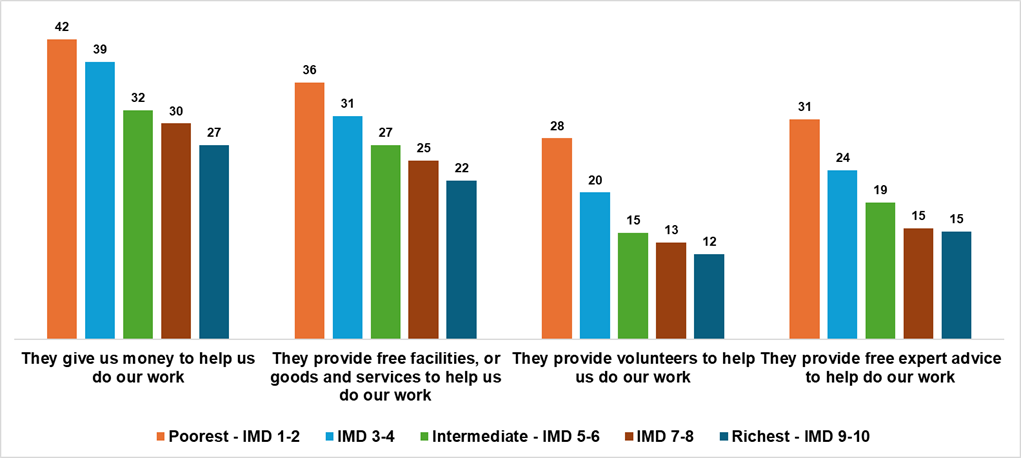Are charities walking away from government contracts to deliver public services?



A new report released today from Third Sector Trends dives into changing relationships and collaborative working in the VCSE sector.
Third Sector Trends has been surveying the Voluntary, Community and Social Enterprise (VCSE) sector every three years since 2010. It's the only large-scale and fully representative longitudinal national survey in the UK which can produce robust and detailed comparative analysis at regional and national level.
In 2025, 8,680 responses were received across England and Wales. Thank to the Nova Members who contributed when we shared this back in June.
The first of five national reports was published today and these are some key insights provided by Third Sector Trends.
“Are charities walking away from government contracts to deliver public services?”
Political enthusiasm to involve voluntary organisations in the delivery of public services under contract remains strong and government has produced new guidelines to smooth procurement processes and set targets for the engagement of voluntary organisations (and small and medium size businesses) in this field of work.
Despite this and previous government efforts to incentivise and help prepare charities to engage in the delivery of public services under contract, interest continues to decline steeply (see Figure 1). Amongst the biggest voluntary organisations, 64% remained involved between 2016 and 2019. That commitment collapsed during the Covid-19 pandemic to 54% and has fallen since to 50% in 2025.

A decade ago, 23% of voluntary organisations were ‘ambivalent’ about getting involved in public service contracts due to lack of information, the need for support or perception or barriers to engagement; only 14% feel that way now – indicating a hardening of opposition to contract working.
In 2022, the main reason why charities were withdrawing from this field of work is that contract values were too low to meet the cost of delivery (especially in a context of rising costs and difficulties in retaining and recruiting staff). These problems have been exacerbated in 2025 with hikes in the National Minimum Wage and employers’ National Insurance contributions.
As Professor Tony Chapman, who undertook the research has concluded:
- “Raising the value of contracts to meet the full cost of delivering public services by charities and social enterprises is the only way forward. Tinkering around the edges by smoothing procurement processes and offering support with capacity building will make only a marginal difference.
- My concern is that such an argument will be ignored by ministers until that point is reached when the only remaining option is to instruct local councils’ and the NHS take statutory public services back in house – leaving government to deal with the fiscal consequences. Certainly, the longer that realisation takes, the harder it will become to re-engage voluntary organisations once their interestand capacity to do this work is lost.”
Support from business is currently in decline, can that be fixed?
In the face of challenging fiscal and market conditions, it is not surprising to report that assistance from business to charities has not yet recovered to pre-pandemic levels.
- In 2016, 39% of voluntary organisations were receiving useful financial support from businesses. As the pandemic waned in 2022, that had fallen to 20%. This has now recovered to 33% (but has still not returned to pre-pandemic levels).
- In-kind support (such as free use of facilities or provision of goods) reached its zenith in 2019 (36% of voluntary organisations received support). That fell to 29% during the pandemic and has fallen further to 27% in 2025.
- The percentage ofvoluntary organisations receiving pro bono support from business has fallen steadily from 28% in 2016 to 20% in 2025.
- Employer supported volunteering was provided to 23% of voluntary organisations in 2016 and 2019. That support fell to 17% during the pandemic and has not since recovered.
The level of business support is much more generous in the poorest areas of England and Wales (see Figure 2). For example, 42% of voluntary organisations in the most deprived areas received money from business compared with 27% in the most affluent areas.

The pandemic led many businesses and voluntary organisations to become more inward looking and choosier about collaborative activity - such behaviours have become more, not less, embedded since. But Third Sector Trends data showsthat this has not happened everywhere.
In North East England, for example, 34% of voluntary organisations were receiving valuable financial support from business in 2022, but that has risen to 38% in 2025 while in most regions support has dropped.
Keeping the dialogue going between the voluntary sector and businesses is important so that when economic and market conditions improve, productive interactions can resume. Local community foundations, as trusted intermediaries, are particularly well placed to help do that because they have deep connections with local businesses and the voluntary sector.
The collaborative culture of the voluntary sector has become more selective but remains strong
The VCSE sector is lauded in policy circles for its willingness and ability to work effectively in partnership. Collaboration within the voluntary sector can take many forms:
- 72% of VCSE organisations remain engaged in ‘informal’ and ‘complementary’ relationships with other voluntary organisations and groups (73% in 2022) and another 9% would like to work this way.
- 62% of organisations continue to ‘collaborate closely but informally’ with other VCSEs (65% in 2022). Complementary working is an option 13% of organisations are considering.
- The number of VCSE organisations working in ‘formal partnership’ arrangements has fallen from 34% in 2022 to 28% in 2025) and another fifth are interested in doing so. Over half (53%) of the sector is currently disinterested in formal partnership working (up from 47% in 2022).
During the Coronavirus pandemic there was a ‘bump’ in formal partnership working for organisations of all sizes, but longer-term decline has continued since. This shows that voluntary organisations have become more ‘selective’ about collaborative working rather than indicating that the quality of remaining partnerships have been compromised.
Levels of formal and informal partnership working are much higher in the poorest areas of England and Wales than in the richest areas. For example, in the most deprived areas 44% of voluntary organisations work together formally compared with just 20% in the most affluent areas.
The voluntary sector has not been deterred from influencing social and public policy
The previous government was concerned about charities exercising political influence and took steps to challenge charities’ right to campaign and lobby. The present government has adopted a more conciliatory stance and has agreed a Civil Society Covenant with the voluntary sector to show its commitment to charity independence while expressing an eagerness to work with the voluntary sector – particularly in the fields of empowering communities and delivering public sector services.
Third Sector Trends established baseline statistics on the involvement of charities in politics, campaigning and lobbying in 2022 and there has been little change since then. For example, 43%of voluntary organisations strongly agree that they steered clear of political issues in 2022, 41% do so now. The percentage of voluntary organisations agreeing that they engage in campaigning (~48%) or lobbying (~42%) to further the interest of beneficiaries remain about the same.
The extent to which voluntary organisations feel valued (87%), informed (64%) and involved (42%) by local public sector organisation has fallen a little compared with previous years – but this may be related to ‘raised expectations’ in the context of government policy drivers associated with the local devolution of decision making. The evidence clearly shows that irrespective of their location or purpose, most voluntary organisations feel equally valued, informed and involved by their local public sector organisations.
As for their opinions on the impact of devolution policies, headline findings show that.
- A small majority of VCSE organisations (56%) broadly agree that opportunities for effective collaborative working have increased (e.g. with local council / NHS).
- Relatively few VCSE organisations (31%) agree that policy makers now give more notice now about new initiatives.
- A majority of VCSE organisations (61%) disagree that policy makers have become more receptive to their arguments.
- When asked if they feel that public sector agencies are now working more effectively together, most VCSE organisations remain sceptical: 61% of VCSEs disagree.
- About 61% of VCSE organisations say that they are asked more often now to help engage with thelocal community by local public sector agencies – this is especially common amongst larger organisations working in poorer areas.
All of this important research shows how much work there is to do. Nova is here to support the VCSE sector in Wakefield District and if you would like to get in touch with our team, you can reach us at info@nova-wd.org.uk or 01924 367418.
Download the full report. Further reports will be published between now and March 2026.






.png)












